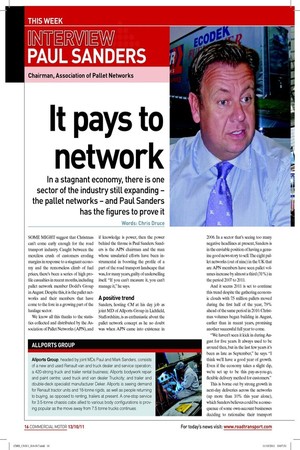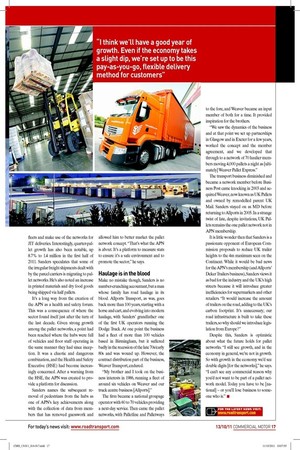It pays to network
Page 13

Page 14

If you've noticed an error in this article please click here to report it so we can fix it.
In a stagnant economy, there is one sector of the industry still expanding – the pallet networks – and Paul Sanders has the figures to prove it
Words: Chris Druce
SOME MIGHT suggest that Christmas can’t come early enough for the road transport industry. Caught between the merciless crush of customers eroding margins in response to a stagnant economy and the remorseless climb of fuel prices, there’s been a series of high proile casualties in recent months, including pallet network member Dodd’s Group in August. Despite this, it is the pallet networks and their members that have come to the fore in a growing part of the haulage sector.
We know all this thanks to the statistics collected and distributed by the Association of Pallet Networks (APN), and if knowledge is power, then the power behind the throne is Paul Sanders. Sanders is the APN chairman and the man whose unsalaried efforts have been instrumental in boosting the proile of a part of the road transport landscape that was, for many years, guilty of underselling itself. “If you can’t measure it, you can’t manage it,” he says.
A positive trend
Sanders, hosting CM at his day job as joint MD of Allports Group in Lichield, Staffordshire, is as enthusiastic about the pallet network concept as he no doubt was when APN came into existence in 2006. In a sector that’s seeing too many negative headlines at present, Sanders is in the enviable position of having a genuine good news story to sell. The eight pallet networks (out of nine) in the UK that are APN members have seen pallet volumes increase by almost a third (31%) in the period 2007 to 2011.
And it seems 2011 is set to continue this trend despite the gathering economic clouds with 7.5 million pallets moved during the irst half of the year, 7.9% ahead of the same period in 2010. Christmas volumes began building in August, earlier than in recent years, promising another successful full year to come.
“We haven’t seen it kick in during August for ive years. It always used to be around then, but in the last few years it’s been as late as September,” he says. “I think we’ll have a good year of growth. Even if the economy takes a slight dip, we’re set up to be this pay-as-you-go, lexible delivery method for customers.” This is borne out by strong growth in next-day deliveries across the networks (up more than 10% this year alone), which Sanders believes could be a consequence of some own-account businesses deciding to rationalise their transport leets and make use of the networks for JIT deliveries. Interestingly, quarter-pallet growth has also been notable, up 8.7% to 1.4 million in the irst half of 2011. Sanders speculates that some of the irregular freight shipments dealt with by the parcel carriers is migrating to pallet networks. He’s also noted an increase in printed materials and dry food goods being shipped via half pallets.
It’s a long way from the creation of the APN as a health and safety forum. This was a consequence of where the sector found itself just after the turn of the last decade. Given strong growth among the pallet networks, a point had been reached where the hubs were full of vehicles and loor staff operating in the same manner they had since inception. It was a chaotic and dangerous combination, and the Health and Safety Executive (HSE) had become increasingly concerned. After a warning from the HSE, the APN was created to provide a platform for discussion.
Sanders names the subsequent removal of pedestrians from the hubs as one of APN’s key achievements along with the collection of data from members that has removed guesswork and allowed him to better market the pallet network concept. “That’s what the APN is about. It’s a platform to measure stats to ensure it’s a safe environment and to promote the sector,” he says.
Haulage is in the blood
Make no mistake though, Sanders is no number-crunching accountant, but a man whose family has road haulage in its blood. Allports Transport, as was, goes back more than 100 years, starting with a horse and cart, and evolving into modern haulage, with Sanders’ grandfather one of the irst UK operators running the Dodge Truck. At one point the business had a leet of more than 100 vehicles based in Birmingham, but it suffered badly in the recession of the late 70s/early 80s and was wound up. However, the contract distribution part of the business, Weaver Transport, endured.
“My brother and I took on the business interests in 1986, running a leet of around six vehicles on Weaver and our truck centre business [Allports].” The irm became a national groupage operator with 60 to 70 vehicles providing a next-day service. Then came the pallet networks, with Palletline and Palletways to the fore, and Weaver became an input member of both for a time. It provided inspiration for the brothers.
“We saw the dynamics of the business and at that point we set up partnerships in Glasgow and in Exeter for a few years, worked the concept and the member agreement, and we developed that through to a network of 70 haulier members moving 4,000 pallets a night as [ultimately] Weaver Pallet Express.” The transport business diminished and became a network member before Business Post came knocking in 2003 and acquired Weaver, now known as UK Pallets and owned by remodelled parent UK Mail. Sanders stayed on as MD before returning to Allports in 2005. In a strange twist of fate, despite invitations, UK Pallets remains the one pallet network not in APN membership.
It is little wonder then that Sanders is a passionate opponent of European Commission proposals to reduce UK trailer heights to the 4m maximum seen on the Continent. While it would be bad news for the APN’s membership (and Allports’ Deker Trailers business), Sanders views it as bad for the industry and the UK’s high streets because it will introduce greater ineficiencies for supermarkets and other retailers. “It would increase the amount of trailers on the road, adding to the UK’s carbon footprint. It’s unnecessary; our road infrastructure is built to take these trailers, so why should we introduce legislation from Europe?”
Despite this, Sanders is optimistic about what the future holds for pallet networks. “I still see growth, and in the economy in general, we’re not in growth. So with growth in the economy we’d see double digits [for the networks],” he says. “I can’t see any commercial reason why you’d not want to be part of a pallet network model. Today you have to be [national] – or you’ll lose business to someone who is.” ■
FOR THE LATEST NEWS VISIT:
www.roadtransport.com













































